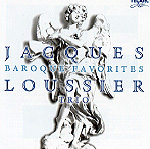Back in 1959/1960 when pianist Jacques Loussier recorded his then-innovative jazz excursions into the music of Bach–titled Play Bach and now reissued on two Decca CDs–the idea that Baroque music possessed a natural and logical link to modern jazz was a revolutionary idea. Other jazz musicians took up the notion–the Modern Jazz Quartet’s John Lewis being one of the more illustrious–and Baroque jazz reached its developmental and popular peak with the amazing recordings and concert performances by the Swingle Singers, beginning with that vocal ensemble’s Jazz Sebastièn Bach LPs (now reissued on CD) in the early-to-mid-1960s. Here, Loussier returns and 40 years later applies much the same jazz-inspired sensibility to composers such as Handel, Scarlatti, Marcello, and Albinoni. Instead of his earlier partners, bassist Pierre Michelot and drummer/percussionist Christian Carros, he’s joined here by equally competent accomplices Benoit Dunoyer de Segonzac (bass) and André Arpino (drums). The results are every bit as entertaining if not as eyebrow-raising as they were back in 1960.
No one can complain that Loussier’s insights aren’t as inspired or as buoyant or as dynamic. In fact, with Telarc’s vibrant, clear-as-a-bell sound, these interpretations have an immediacy and presence that’s more sonically powerful than those earlier issues, even though the remastered Decca CDs are extremely good. There are some interesting touches here: in his realization of Marin Marais’ La sonnerie de Sainte-Geneviève du Mont (undoubtedly the first-ever jazz treatment of Marais’ music) Loussier moves into a familiar 5/4 groove as if in tribute to Dave Brubeck’s legendary Take Five; and the ingenious rendition of Handel’s famous Largo (from Xerxes) is one of the disc’s highlights. My only reservation is the occasionally intrusive low bass and drum sound–a little too much sound pressure on the ears for my taste. And, although I swore I’d never again review or listen to a disc that contained that not-even-a-real-canon piece of Pachelbel drivel–yes, that one–it came in the middle of the program, before I knew it was there; so, you can listen to it or you can skip it, as I did. But I didn’t let that inhibit my enjoyment of the welcome return of one of the better and more memorable musicians to come out of those weird and wonderful 1960s. And if you were there, or wish you had been, you shouldn’t hesitate to give this a try either. (And while you’re at it, check out those Decca reissues, Play Bach Nos. 1 & 2.) [9/5/2001]
































